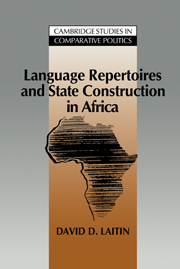Book contents
- Frontmatter
- Contents
- Preface
- PART I LANGUAGE REPERTOIRES AND THE STATE
- 1 Language repertoires as political outcomes
- 2 Three theories explaining language outcomes
- 3 Do language outcomes matter?
- PART II SOCIOLOGICAL AND POLITICAL FORCES DESCRIBED
- PART III STRATEGIC THEORY APPLIED
- PART IV CONCLUSION AND POLICY RECOMMENDATIONS
- Notes
- References
- Index
3 - Do language outcomes matter?
Published online by Cambridge University Press: 03 May 2010
- Frontmatter
- Contents
- Preface
- PART I LANGUAGE REPERTOIRES AND THE STATE
- 1 Language repertoires as political outcomes
- 2 Three theories explaining language outcomes
- 3 Do language outcomes matter?
- PART II SOCIOLOGICAL AND POLITICAL FORCES DESCRIBED
- PART III STRATEGIC THEORY APPLIED
- PART IV CONCLUSION AND POLICY RECOMMENDATIONS
- Notes
- References
- Index
Summary
If the strategic theory proposed in Chapter 2 were accepted without qualification, we could model the payoffs for learning any particular language, the opportunity costs of maintaining a multilingual repertoire, and predict as an equilibrium outcome the eventual coordination of the most efficient means of societal communication. The model might share characteristics with what game theorists call a “coordination game,” so called because both parties have an interest in coordination, even though they have a conflict of interest concerning the coordination point. Consider the game played among small computer firms that are deciding whether to promote computers that rely on DOS machine language or Apple machine language. Each firm knows that aggregate sales will be higher if there is an industry standard. Since all firms have a clear interest in a coordinated solution, game theory predicts that one of the two equilibria (all Apple, or all DOS) will eventually be reached, the outcome depending on the relative gains for early DOS switchers into Apple, compared to the gains for early Apple switchers into DOS. Once a “tip” into one language begins, the firms using the minority language will cascade into the camp of the majority. Computer-language rationalization would be the result.
Such models cannot be blindly applied to shifts in natural languages in real social, cultural, and political settings. First, the basic insight of primordial theory, despite its inability to explain change and the strategic use of cultural markers, remains: People have an apparently intractable attachment to their language or dialect which is not subject to easy calculation.
- Type
- Chapter
- Information
- Language Repertoires and State Construction in Africa , pp. 47 - 66Publisher: Cambridge University PressPrint publication year: 1992



